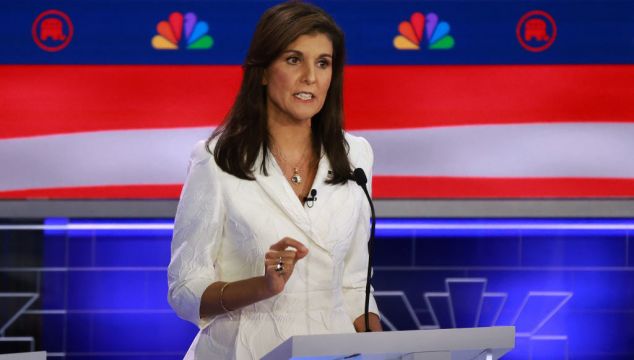Republican US presidential contender Nikki Haley's campaign is booking $10 million in advertising, her camp said on Monday, as she tries to scoop up supporters of US senator Tim Scott, a fellow South Carolinian who dropped out on Sunday.
The ads will be placed on TV, radio and the internet starting in the first week of December in Iowa and New Hampshire, Ms Haley's campaign said.
Those two states are the first and second, respectively, to select a preferred nominee to take on Democratic president Joe Biden in the 2024 general election.
Ms Haley, a former US ambassador to the United Nations, is in third place in the nominating contest behind former president Donald Trump and Florida governor Ron DeSantis. Mr Trump has been well ahead in opinion polls, with Mr DeSantis a distant second.
Ms Haley appeared to have caught a small break, however, when Mr Scott unexpectedly dropped out on Sunday night. Both are South Carolina natives, and they have a similar base of donors and voters.
Major donors switch to Haley
Two major donors to Mr Scott's campaign told Reuters on Sunday night that had already switched their support to Ms Haley, while a third said he would likely follow suit.
In a statement on Monday, Ms Haley's campaign argued she was the best candidate to take on Mr Trump, as she has been dedicating significant resources to Iowa, New Hampshire and South Carolina.

Mr DeSantis, the only other Trump alternative with a significant national base of support, has been more focused on Iowa, where his team believes he has the best shot at a strong showing.
In state-level polls, Ms Haley typically leads Mr DeSantis in New Hampshire and South Carolina, while Mr DeSantis leads Ms Haley in Iowa.
"It's clear there is no way Nikki Haley can beat Donald Trump, and every dollar spent on her candidacy is a kind of in-kind contribution to the Trump campaign," said Andrew Romeo, the communications director for Mr DeSantis' campaign
Last week, Mr DeSantis was endorsed by Iowa's governor, Kim Reynolds, who is deeply popular among conservatives in the state.







